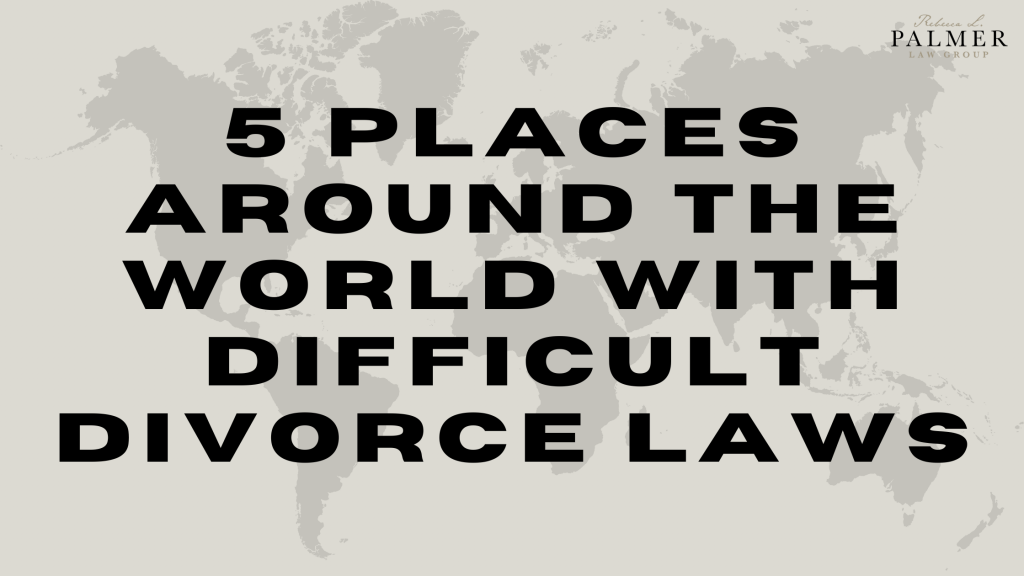
Divorce can be an arduous and emotionally charged journey, with certain parts of the world presenting additional challenges due to stringent legal regulations. From the Middle East to Asia, numerous countries have enactments that heavily favor men, significantly complicating the process of obtaining a divorce for women. As this blog post delves into the subject matter, we aim to unveil five nations where divorce laws are particularly onerous, shedding light on the myriad obstacles couples encounter while seeking to terminate their marriages.
Saudi Arabia

Filing for divorce is incredibly difficult for women in Saudi Arabia. The law only permits a woman to obtain a divorce with her husband’s approval or if he has caused her harm. However, in reality, it is still extremely tough for Saudi women to obtain a judicial divorce. On the other hand, men have the unilateral right to get a summary divorce (talaq) without having to provide any legal justification, and the divorce becomes effective immediately. To address this issue, new regulations were introduced on 6th Jan 2019, requiring husbands to notify their wives about divorce via text message. Though it is only a tiny step, it is aimed at preventing women from being divorced without their knowledge.
Philipines
In the Philippines, divorce is still illegal. The country is one of only two in the world where divorce is still illegal, the other being Vatican City. While annulment is an option, the process is lengthy, expensive, and often inaccessible to those with low income. This leaves many couples trapped in unhappy marriages, unable to move on and start anew. Despite recent efforts to legalize divorce, including a bill passed by the House of Representatives in 2018, the Senate has yet to follow suit. There is still a long way to go to provide Filipinos with legal means to end marriages.

Vatican City

In Vatican City, divorce is not only hard to get, but it is illegal. As the smallest independent state in the world, Vatican City is governed by its own set of laws, which are based on Catholic canon law. According to the Catholic Church, marriage is a sacred union that is meant to last a lifetime, and divorce is not recognized as a valid option for ending a marriage.
While annulment is possible in some cases, it is a complex and often lengthy process that requires the involvement of the Catholic Church’s tribunal system. As a result, divorce is not a legal option for the few people who reside in Vatican City, which has fewer than 1,000 people. This means that couples who are unhappy in their marriages have limited options for ending them, which can have a significant impact on their lives and well-being.
Japan
In Japan, there is a law that prohibits women from remarrying within 100 days of a divorce. This law does not apply to men who can legally remarry immediately without any waiting period. However, the law regarding women’s remarriage has recently changed significantly. Before June 2016, women had to wait for six months before remarrying. Although this shows that Japan is taking steps in the right direction, there is still a lot of work to be done in terms of equal rights for Japanese women in divorce.

Egypt

Egypt introduced no-fault divorce in 2000, but Egyptian women still face unequal access to family courts and protections under the law. Prior to the new laws, women could only be granted a divorce if they could prove physical or psychological abuse, while men only need to follow the Islamic law of saying “I divorce you” three times, or file a notice with the government marriage registrar.
In Egypt, personal status laws give priority to Islamic rules for marriage and divorce. However, this rule does not apply to non-Muslim couples who share the same religious denomination. For instance, a Catholic husband with a Coptic wife would not be subject to Islamic law under the current regulations.
While women can now file for no-fault divorce, they are required to give up all financial and property rights and repay any dowry given by their husband’s family upon marriage. In order to receive spousal support, women must prove that their husband harmed them during the marriage. They also need an eye witness and photographic documentation for any physical abuse. Egyptian men, on the other hand, have unconditional rights to divorce and do not need to go to court to obtain it. Women filing for divorce have to go through mediation with their estranged husbands, while men do not.
Rebecca L. Palmer Law Group Can Help
While divorce laws can vary greatly around the world, with some countries imposing stricter regulations than others, every couple facing the challenges and stress of divorce deserve the support of experienced and compassionate legal professionals. Rebecca L. Palmer Law Group—an esteemed alliance of attorneys recognized for their profound expertise in family law, dedicated to providing a comprehensive array of services tailored to meet the specific needs of our clients.
With our unwavering commitment to excellence and unparalleled guidance, individuals can confidently navigate the intricate complexities of divorce, assured of attaining serenity and tranquility amidst the process. We invite you to reach out to the Rebecca L. Palmer Law Group today; discover firsthand the breadth of our services and the transformative impact we can have on your journey.